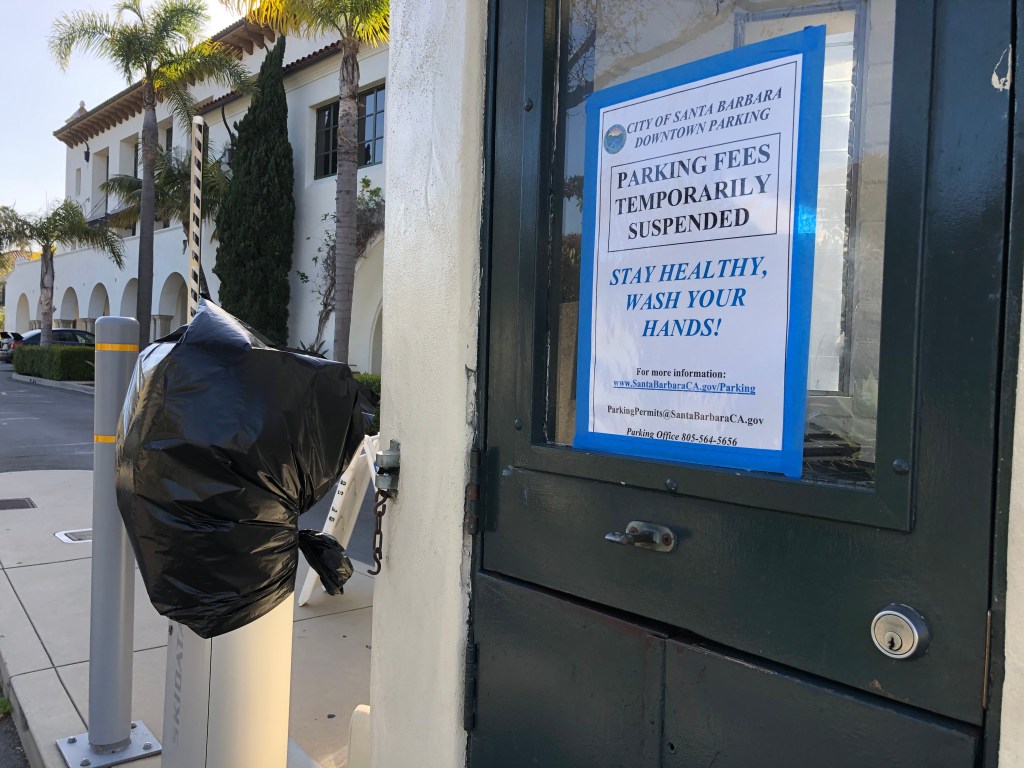Hundreds of hourly employees who work for Santa Barbara’s City Hall — or were about to — will now be joining the 3.3 million Americans already filing for jobless benefits after layoff notices were sent out on Friday. Like most major employers, City Hall is experiencing a violent reduction of revenues as a result of the COVID-19 epidemic, and this wave of layoffs is no doubt only the first of many shoes to drop.
Mayor Cathy Murillo confirmed the layoff notices went out, stating, “Our employees are precious to us. I’m really sorry to say we have to take this kind of action.” She added, “This is an unprecedented kind of disaster.”
Parking kiosk attendants personify the most obvious and emblematic of the city’s hourly workforce, and they will be discontinued. City Hall is no longer charging for parking. Gone as well will be all the many workers hired every summer for a myriad of Parks and Recreation programs.
Some workers have complained that they were laid off without getting compensated for the unused paid time off they have accrued. City Administrator Paul Casey responded that the city plans on paying out accrued PTO on the check that comes out in two weeks and encouraged them to “to contact our HR Department to resolve any issues or concerns they have.”
Casey said he wasn’t sure yet as to the total number of layoff notices sent but said it would clearly be in the hundreds.
Murillo noted that under the Senate’s recently negotiated and signed $2 trillion emergency recovery plan, those laid off will now be eligible for enhanced unemployment compensation payments and for a longer duration.
“I have faith that the state and federal grants will be there for people who’ve lost their jobs,” Murillo added. The mayor highlighted the emergency measure adopted by both the Santa Barbara City Council and the county Board of Supervisors this past week barring landlords — both commercial and residential — from evicting any tenants over the next two months for failure to pay their rent because of the COVID-19 disaster.
To an uncommon degree, the City of Santa Barbara lives and dies by the hospitality industry. Fully 17 percent of the jobs within city limits involve the hotel, motel, bar, and restaurant industries. Sales taxes and bed taxes make up about $40 million a year in revenues to City Hall.
“We don’t know how bad the bad news is yet,” said Casey, “so we don’t know precisely how big of a nut we’re going to have to crack. But it’s going to be big, and it’s going to hurt.”
City Hall currently has about $30 million in reserves, but depending on the duration of the virus and the shutdown, that could get swallowed up quickly. Casey said it’s still too soon to discuss layoffs and furloughs for full-time salaried workers but acknowledged such conversations could happen.
During the Great Recession of 2008, he noted, the unions representing the major bargaining units all “stepped up and made serious concessions.” (City Hall just signed new contracts with its police and firefighters unions. Police and fire account for about 60 percent of City Hall’s expenses.) Vacant positions were not filled, but the city managed to weather that storm without laying anyone off. City Hall, he noted, has just implemented a hiring freeze. Vacant positions will remain fallow.
Giving the powers that be a modicum of potential wiggle room in all this is Measure C, the sales tax measure approved by voters a couple of years ago designed to fund overdue, overpriced, and underfunded infrastructure projects, such as the construction of new police station. Measure C generates roughly $20 million a year. Unlike many similar measures, Measure C does not legally mandate on what the revenues must be spent. The council has legal discretion, if it so chooses, to dip into these funds to defray costs associated with recovery. In typical years, that would have been politically perilous in the extreme, but these are anything but typical times.
In the meantime, it’s doubtful that the $2 trillion relief and recovery bill just ratified by the Senate and signed by the president will provide any direct and immediate relief to the City of Santa Barbara. That measure targeted its largesse for cities of 500,000 or more. There may be some state grant money for smaller cities like Santa Barbara; and perhaps Congress will pass a supplemental relief bill that provides funding for smaller-sized cities. All of that is yet to be determined.

